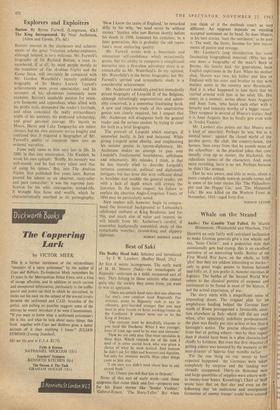Best of Saki
AT first it seems incongruous. The early work of H. H. Munro (Saki)—the monologues of Reginald—entertain in a mild, mannered sort of way. They belong to those satirists who cannot quite take the society they come from, yet want to win its applause.
'There are certain fixed rules that one observes for one's own comfort (said Reginald). For instance, never be flippantly rude to any in- offensive, grey-bearded stranger that you may meet in pine forests or hotel smoking-rooms on the Continent. It always turns out to be the King of Sweden.'
'The restraint must be dreadfully irksome to you (said the Duchess). When I was younger, boys of your age used to be nice and innocent.'
'Now we are only nice. One must specialise in these days. Which reminds me of the man I read of in some sacred book who was given a choice of what he most desired. And because he didn't ask for titles and honours and dignities, but only for immense wealth, these other things came to him also.'
'I am sure you didn't read about him in any sacred book.'
`Yes; I fancy you will find him in Debrett.'
None of this sort of early work—and those epigrams that come thick and fast—prepares one for his finest stories like `Sredni Vashtar,' `Gabriel-Ernest,' The Story-Teller.' But when you think of it the methods aren't so very different. An epigram depends on standing accepted sentiment on its head. So does Munro, in his best stories, 'turn the sentiment,' as he puts it. The wolf, the ferret, become for him instru- ments of justice and revenge.
Mr. Lambert's long introduction has some fascinating biographical material. (Why has no one done a biography of the man?) Born in Burma, his family had, for generations, been English expatriates in the East. When his mother died, Munro was two, his father sent him to England with his sister and brother to stay with maiden aunts in the country near Barnstaple. And it is what happened to him there that he carried around with him in his adult life. His sister, in a memoir, writes about Aunt Augusta and Aunt Tom, 'who hated each other with a ferocity and intensity worthy of a bigger cause.' They reappear in several of Munro's stories. And it is Aunt Augusta that he finally gets even with in `Sredni Vashtar.'
Mr. Lambert also points out that Munro was a kind of anarchist. Perhaps he was, but in a limited sense: against the closed world of the garden party, the club, the country-house, the hostess. Seen away from that he sounds more of the schoolboy : in the practical jokes that con- tinually crop up as stories; the blackmail; the ridiculous names of the characters. And, even more revealing, there is no sex. Perhaps because he didn't like women.
That he was aware, and able to write, about a more complex attitude towards people comes out in some of his later stories like 'The Philanthro-.l pist and the Happy Cat,' and 'The Mappined Life.' He was killed on the Western Front in November, 1916—aged forty-five.
NORMAN LEVINE


































 Previous page
Previous page